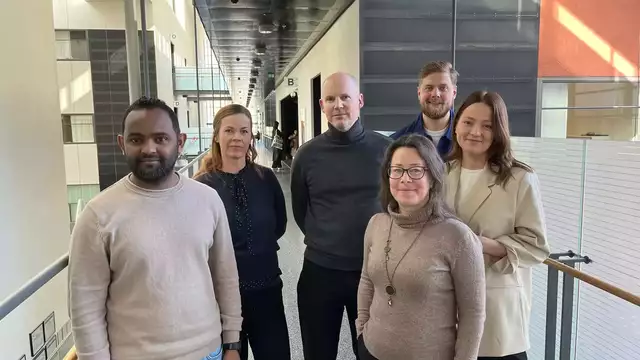Research, development and innovation with a sharp focus on sustainability

In 2023 Arcada reached two important milestones within sustainability in research, development and innovation activities. Reed as biomass made its way to our labs and SMEs received support and training for their green transition.
Promoting sustainable development is a strategic choice for Arcada, not least because of the social responsibility carried by institutes of higher education. The social responsibility is apparent, both in width and depth, in the 17 UN sustainable development goals that transcend all ongoing RDI projects at Arcada.
– Within every sector of RDI, our strategic focus is to find smart and locally relevant solutions to global problems. To ensure that we contribute to the sustainable development of both society and working life we need cooperation with external actors. Through cooperation we can ensure that our activities are optimised to generate new ideas, technologies and applications that support sustainability, for instance, developing new services that reduce the use of resources, support environmentally friendly alternatives and improve working conditions, says Camilla Wikström-Grotell, Dean of the Graduate School and Research.

Picture of Camilla Wikström-Grotell, Dean of the Graduate School and Research
Green transition and usable reed biomass
In 2023 one of the smart solutions was implemented through a one-year project called React, comprising green transition of small and medium sized businesses, with focus on adaptability. The project was a joint venture with 22 other Finnish higher education institutions, where Arcada’s experts guided micro, small and medium sized enterprises toward a green business conversion. The support was offered as micro-courses, events, and workshops. Through the project, funded by the European Social Fund REACT-EU, Arcada could respond to the need for an improved Swedish-language knowledge base for green transition. With funding from The Swedish Cultural Foundation in Finland, the project also published a handbook (in Swedish) on the subject.

Picture of the REACT project group. From left: Silas Gebrehiwot, Paula Linderbäck, Stewart Makkonen-Craig, Erkka Toikkanen, Erica Scott and Felicia Söderlund.
The year also saw the beginning of the international Baltic Reed biomass project. Through the project, the researchers want to highlight, from many different viewpoints, the benefits of harvesting reeds in the Baltic Sea. Firstly, the harvesting contributes to less nutrients in the Baltic Sea, and in this way marine habitats can be restored. Secondly, the harvested reed biomass can in turn be used to develop sustainable and profitable value chains. The project is funded by EU Interreg Central Baltic.
– We work to discover potential uses for the reed harvested in the Baltic Sea. There are already several areas of use, and companies that exploit it, but additional use cases and companies are needed to make use of the full potential that reed constitutes, explains environmental expert and project leader Laura Montin.

Picture of the Baltic Reed project group. From left: Paula Linderbäck, Laura Montin and Rasmus Björkvall.
Student engagement is a contributing factor
Through RDI, Arcada works for a sustainable life on a wide scale, evident in also within teaching and the degree programmes on offer. Research underpins all our education, and education in turn, has a central role in carrying out research, not least through the engagement of our students. A concrete example was the Design Sprint week at the end of last year, with close to 400 students gathered in multi-professional teams, each picking an optional RDI project with the aim of working out solutions connected to the UN sustainable development goals. The Baltic Reed project proved a popular choice, and the Design Sprint produced more than 20 new suggestions for the use of reed.
– We have entered a dynamic period where we teach both sustainability competence and develop an understanding of how professional competence can be used in aid of a more sustainable world. Real sustainability is not dependent on a world of specialists working in isolation, but on an array of professionals, from engineers to moviemakers, whose education allows them to weave it into their work and to create a future that is more sustainable, says Tomas Träskman, Vice Dean of the Graduate School and Research.

Picture of students during the design week.